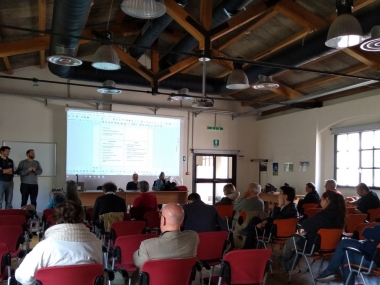Rome hosts its 2nd ULG meeting
Edited on
13 May 2019The 2nd Urbact Local Group (ULG) meeting of Rome took place April 6th at the Ex Cartiera Latina centre (on the ancient Roman Appia way). The 25 attendees came from different urban gardens in the city, citizens’ associations involved in urban gardening, start-ups and City Administration.

The main objectives of the meeting were:
- to inform the ULG members on the results of the Transnational Meeting had taken place in Caen on 2nd -3rd April,
- to open a dialogue with the local stakeholders on the topics of the Improvement Plan (possible measures to improve the good practice of Rome) through the exchange of information on “what has been solved in Rome and what needs further attention”.
The meeting started with the broadcast of the video of the “Peninsula project in Caen” to inform ULG members of the objectives of the City of Caen regarding RU:RBAN: an urban regeneration process to convert a brownfield in a “green urban area” made of urban gardens, agribusiness, training activities, etc.
The second part of the meeting was dedicated to the core of the Rome ULG activities: what has been solved and what hasn’t - how to improve the good practice of Rome? The attendees focused their interventions on the successful actions and on the issues that are still pending. Following are the highlights of the discussion:
Pending issues:
- lack of teenagers (from 12 to 18 years) participating in urban gardens activities,
- involvement of migrants is difficult due to more complicated procedures to obtain residence permits,
- superficiality with which Public Institutions treat urban gardens, there is more to be done,
- Waste disposal: areas used as composters are not succeeding as the gardeners throw away everything, including plastic. Probably a problem related to misinformation,
- the allocation of the lot should not be based on the application of the rankings (which could be seen as discriminatory) but on the answer to the question: who, among the applicants, brings added value to the community? Children are a resource within the gardens. The assignment of a lot is not a right: it is a privilege,
- in order for the aspects of inclusion and integration - promoted by the European project RU:RBAN - to be implemented in large scale within the multiple social policies, they should also be taken in by other departments such as the Department of Social Policies and the Department of Economic Development,
- the regulation should be continuously monitored to keep up with times. The problem is creating the community, therefore, education is needed first and foremost. The model of Rome is controlled chaos, or spontaneity. Without a community this cannot be achieved.
- the main difficulty is participation. The project starts from the idea of cultivating relationships as the garden is basically a socialization tool,
- Ideally, there should be a pre-selection process prior to accepting a new member in the Association. Most people who apply for a lot do not know how to cultivate and do not read neither the regulation of urban gardens nor the association’s regulation. Ad hoc training courses should be conducted,
- maintenance and economic resources for garden management, this is the issue. If the products grown in the garden can't be sold, how can the economic sustainability of the garden be ensured? Through training, socialization and educational activities?
In summary, the most important issue emerged from the discussion concerns the creation of the community.
Problems solved:
- irrigation systems,
- training activities for migrants awaiting residence permits,
- in response to the low participation of teenagers in urban gardens, a solution has come through the mechanism of alternating school / work, thanks to an agreement with the Technical Institute of Agriculture,
- the majority of the assignees of an urban garden in Rome were senior citizens with little experience on how to run an urban garden. The problem was solved thanks to the intervention of the volunteers of the Italian Red Cross who provided the necessary help to run the gardens,
- The gardens must therefore always be shared, available to the districts and to all citizens,
- through urban gardens people develop social relationships based on collaboration, cooperation, integration and participation, as well as horticultural techniques; the urban garden could be the "place" for the promotion of a civic sense in favor of the environment and urban resilience. The gardens are a tool, not a goal, of the City administration,
- Cultivating gardens is like cultivating people. Some of the problems that have emerged are being resolved with the regulation as a tool of governance. Capacity Building: making people able to collaborate, to cooperate. Gardeniser is a new term emerged from the combination of garden and organizer.
- a research action has been conducted by the university on the theme of common spaces and, in particular, on urban gardens as places to create communities: education to encourage a process of connection between people and the environment, as well as the well-being that comes from cultivating vegetable gardens,
- urban gardens must further develop and funding exists for those who promote urban gardens. Rome has many spaces that can be transformed into urban gardens. The soil is the origin of our survival.
Summary of the steps made forward:
The technical problems presented by the various associations during the meeting, such as waste disposal / compost, water, low presence of young people aged 12 to 18, can all be solved through the use of a gardeniser or through "training" courses on how to use the urban garden in line with the regulation.
Two points have emerged:
1. the more diverse the community, the better the social inclusion,
2. through comparison and exchange of information, new actions are born.
The model that Rome will have to export to the other cities that are part of the Ru:rban project, with regard to urban gardens, is the controlled chaos, ie the spontaneity with which urban gardens are developed, thanks to "active citizenship".
 Submitted by Patricia Hernandez on
Submitted by Patricia Hernandez on
